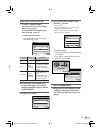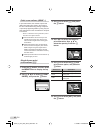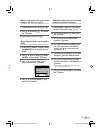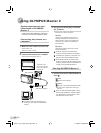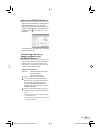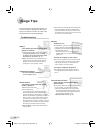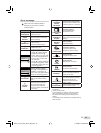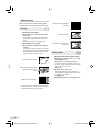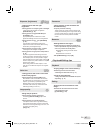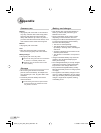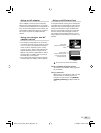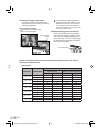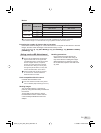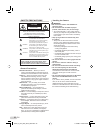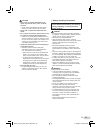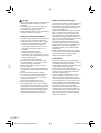
47
EN
Exposure (brightness)
“Taking pictures with the right
brightness”
Taking pictures of a subject against a backlight
A face against the backlight is brightened.
[SHADOW ADJ] (p. 18)
Taking pictures using [FACE DETECT] for
[AF MODE] (p. 25)
Appropriate exposure is obtained for a face
against the backlight, and the face is brightened.
Taking pictures using [n] for [METERING]
(p. 25)
The brightness is adjusted according to the
subject in the center of the screen without being
infl uenced by the background light.
Taking pictures using [FILL IN] (p. 19) fl ash
A face against the backlight is brightened.
Taking pictures using exposure compensation
(p. 19)
Adjust the brightness while viewing the screen
for taking the picture. Normally, taking pictures of
white subjects (such as snow) results in images
that are darker than the actual subject. Use the F
button to adjust in the positive direction to express
whites as they appear.
When taking pictures of black subjects, on the
other hand, it is effective to adjust in the negative
direction.
Color hue
“Taking pictures with colors at the same
shade as they appear”
Taking pictures by selecting [WB] (p. 24)
Best results in most environments can normally
be obtained with the AUTO setting, but for some
subjects, you should try experimenting with
different settings. (This is especially true for
sunshade under a clear sky, mixed natural and
artifi cial light settings, and so on.)
Image quality
Taking sharper pictures
Taking pictures with the optical zoom
Avoid using [DIGITAL ZOOM] (p. 25) to take
pictures.
Taking pictures at a low ISO sensitivity
If the picture is taken with a high ISO sensitivity,
noise (small colored spots and color unevenness
that were not in the original image) can occur, and
the image can appear grainy.
[ISO] (p. 24)
●
●
●
●
●
●
●
●
Panorama
“Taking pictures so that the frames are
stitched smoothly”
A tip for panoramic shooting
Taking pictures by pivoting with the camera at the
center prevents shifting of the image. When taking
pictures of close objects in particular, pivoting with
the lens end at the center produces favorable
results.
Batteries
“Making batteries last longer”
Avoid performing the following operations as
much as possible as they use up battery power
even if no pictures are actually taken.
Repeatedly pressing the shutter button
halfway
Repeated use of the zoom
Set [POWER SAVE] (p. 36) to [ON].
Playback/Editing tips
Playback
“Playing images in the internal memory”
Removing the card from the camera
“Removing the xD-Picture Card” (p. 11).
“Using the microSD card”
“Using a microSD card/ microSDHC card (sold
separately)” (p. 12)
Editing
“Erasing the sound recorded to a still
image”
Record over the sound with silence when
playing back the image
[R (Post REC)] (p. 30)
●
●
●
●
●
●
●
d4377_e_oima_000_book_cs2e.indb 47d4377_e_oima_000_book_cs2e.indb 47 7/1/2008 12:09:10 PM7/1/2008 12:09:10 PM



